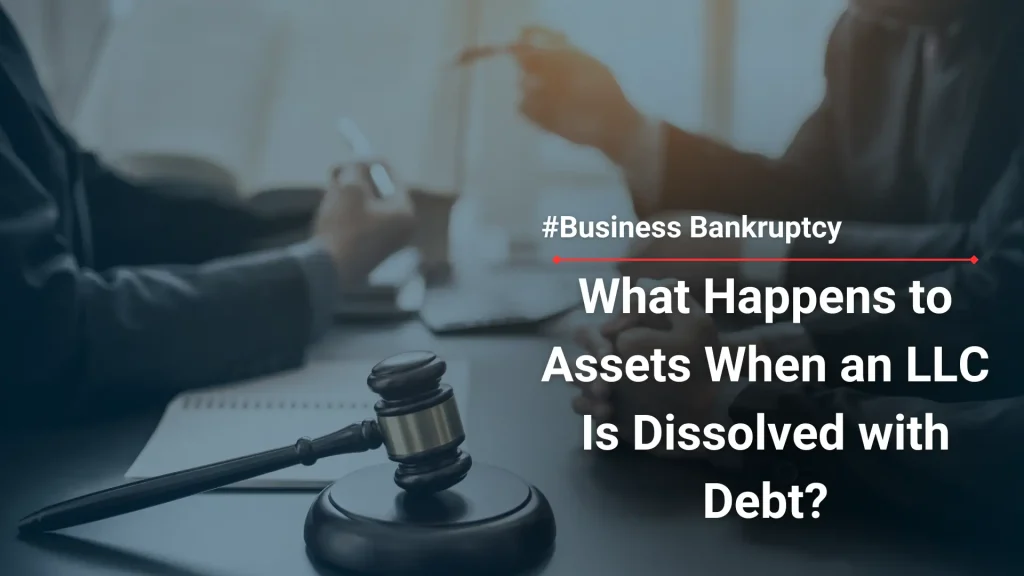What Happens to Assets When an LLC Is Dissolved with Debt?
Posted on Sunday, September 1st, 2024 at 9:00 am

When a limited liability company’s owners choose to close the company and wind up operations, what happens to assets when an LLC is dissolved? When an LLC dissolves with outstanding debts, it must use its assets (including liquidating or selling assets to generate cash) to pay off those debts. LLCs must follow specific procedures to resolve outstanding debts. In cases where an LLC’s debts and liabilities exceed its assets, the company’s creditors may have the right to force it to file for bankruptcy. As a result, an experienced Raleigh business bankruptcy attorney from our law firm can help an LLC resolve its debts during the dissolution process.
What Happens When an LLC Goes Out of Business?
What happens to assets when an LLC is dissolved? When a limited liability company goes “out of business,” the company dissolves and goes through the “winding up” process. During the winding-up process, the LLC and its members must resolve all outstanding legal matters, including debts and contractual obligations the company owes. As a result, winding up and dissolving an LLC involves gathering and liquidating the company’s assets, including real estate, inventory, equipment, and supplies, to generate funds to pay off the LLC’s outstanding debts and liabilities.
Prioritizing Debt Payments
In most cases, an LLC that winds up and dissolves must notify its creditors of the company’s dissolution. The LLC must provide direct notice to known creditors, such as banks or lenders, and may provide notice to unknown or contingent creditors by publishing notice in a local or regional newspaper.
After gathering and liquidating the company’s assets, the LLC must determine how to pay its debts. For example, when an LLC has secured debts, it must use the proceeds of the sale of any assets securing a debt to pay off that debt. Alternatively, the creditor may have the right to seize the asset(s) securing the debt, such as leased equipment. Multiple creditors may hold a security interest in an asset, with each debt holding differing priority over other debts.
The LLC must use other assets or the proceeds of the sale of assets not securing specific debts to pay unsecured debts, such as credit card debt, lines of credit, or contractual obligation (like lease termination fees). The company may prioritize debt payments as they come due during the winding-up process. Furthermore, the LLC’s members may also become the company’s creditors, such as by loaning money to the company instead of contributing capital or leasing real estate or equipment.
Distribution of Remaining Assets
When an LLC has satisfied all known outstanding debts, the company typically returns each member’s capital contribution – the amount of cash each member has invested. Afterward, the company may distribute its remaining assets and cash to its members according to each member’s ownership percentage or per another formula specified in the LLC’s operating agreement. Sometimes, the LLC’s members may keep remaining assets in reserve for several months or years to satisfy unknown or contingent liabilities arising after the company has dissolved.
When the LLC dissolution incurs a liability – such as when a party files a lawsuit against the company and obtains a judgment – the LLC’s members become personally liable for that debt to the extent of the distribution they received during dissolution. Keeping a reserve means the LLC’s members do not have personal liability for contingent debts that may accrue after dissolution or do not have to sit on their share of distributed assets as a security against such liability.
Handling Insufficient Assets
 The company becomes insolvent if the LLC’s outstanding liabilities exceed its assets. However, due to the limited liability feature of an LLC, the company’s members have no personal responsibility for the company’s debts, except to the extent of their investment in the LLC (unless members have personally guaranteed the company’s debts).
The company becomes insolvent if the LLC’s outstanding liabilities exceed its assets. However, due to the limited liability feature of an LLC, the company’s members have no personal responsibility for the company’s debts, except to the extent of their investment in the LLC (unless members have personally guaranteed the company’s debts).
When an LLC dissolves while insolvent, its unsecured creditors may receive a partial payment on the outstanding debts. The members receive nothing back from their investment and capital contributions. However, creditors may refuse to accept the LLC’s insolvent status and force the company into bankruptcy instead of dissolution. If creditors force the company into bankruptcy, the disposition of the LLC’s assets will occur under bankruptcy laws and procedures.
Contact a Business Attorney for Help Winding Up Your LLC
Before dissolving your LLC when it has become insolvent or the company’s debt has become unmanageable, get the legal advice and guidance you need to protect your rights and interests. Contact Bradford Law Offices today at (919) 758-8879 for an initial consultation with a skilled Raleigh business bankruptcy attorney to learn more about your rights and options for dissolving or winding up an LLC with outstanding debts.
Related Posts:
What Disqualifies You From Filing Bankruptcies as a Business?